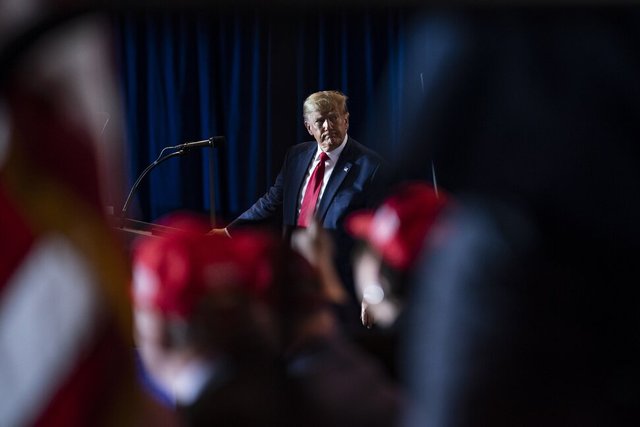Spoiler Alert? How Trump Could Win

The state of American politics has reached a nadir, and it's leading people of many ideological stripes to a similar conclusion: there has to be another way.
The thirst for something and someone new has given life to the most recent incarnation of a third-party offering for president. Not that No Labels, a well-funded and determined group, is suggesting the creation of a third party to compete with Democrats and Republicans. Instead, it's claiming a "common sense" presidential ticket of a Democrat and a Republican could unify the country with a centrist, compromise agenda.
To elections reform advocates, it's a step – though not necessarily the right one – towards shaking up an outmoded election system in which voters are given two choices, extremists in each party have outsized impact, and the person who gains the most votes might not actually get the job of president.
But, to nervous Democrats, it's a step towards ending not a flawed democratic elections process, but American democracy as citizens know it.
"Our constitution and democracy are at stake," says Rep. James McGovern, a veteran Democratic lawmaker from Massachusetts, about the possibility of a third viable presidential ticket. Such a candidacy would take votes almost exclusively from President Joe Biden and Vice President Kamala Harris, McGovern says.
"The idea of siphoning votes away from Joe Biden to help elect Donald Trump is insane,” he says. “These are not normal times. As a Democrat, this is not about electing a George W. Bush or even a Ronald Reagan, whom I differed with. It's about putting back in the White House a madman who has embraced fascism."
For Matt Bennett, vice president of the Democratic centrist group "Third Way," the No Labels effort isn't a third way at all – it's the tool former President Trump needs to win in 2024, putting the man facing multiple indictments the chance to pardon himself and a slew of others who have already been convicted in the Jan. 6, 2021 insurrection on the Capitol.
"I'm doing this full time," Bennett says of his efforts to expose the impact – if not the mission – of No Labels. "This is 100% a threat to Biden and not to Trump." Notably, members of the Problem Solvers Caucus in the House – which was started by No Labels – have slammed a so-called "unity ticket” as a path to another Trump presidency.
Bennett's view is not just anti-Trump paranoid speculation: a Wall Street Journal poll from April found that when the "double-haters" – those who don't like Biden or Trump – are forced to make a choice between the two men, Biden wins the disaffected by close to 40 percentage points. Presumably, Bennett and others predict, those would be the votes a "No Labels" ticket could siphon off – handing victory to Trump in what is almost certain to be a tight contest.
No Labels rejects the idea that a bipartisan ticket could be a spoiler in the election.
Polling in December, 2022 by No Labels found that a bipartisan, centrist ticket would draw voters away from each major party candidate, the group says on its website.
Adds Ryan Clancy, No Labels’ chief strategist: “The election is over 15 months away and no one knows if No Labels will have a ticket, who would be on it, or what the conditions in the country will be in November 2024. So it is ridiculous for anyone to say they know how or if a No Labels Unity ticket would benefit one side especially given we’d have a both a Democrat and a Republican on it.
“But that unfortunately hasn’t stopped some very powerful groups from launching a hypocritical and undemocratic campaign to undermine No Labels’ ballot access efforts and to deny millions of Americans a choice they so clearly want,” Clancy says.
A poll released Thursday by Monmouth University appears to back up No Labels’ survey: When voters were presented with a choice among Biden, Trump and a third party ticket, “the overall effect appears to be a wash,” Monmouth said in a release accompanying its poll. In such a hypothetical situation, Biden’s support drops from 47% to 37% nationally, while Trump’s support drops from 40% to 28%, the poll found.
Still, Democrats fear a shift of just a few thousand votes in a battleground state could add up to a Trump victory. After all, they note, Democrats Hillary Clinton and Al Gore won the popular vote in their respective presidential campaigns, but still lost the Electoral College.
“That’s the danger – at the margins, small percentages matter” in battleground states, Bennett says.
Third-party candidates haven't fared well in the modern era, even while tapping the same voter frustration with the election system. Republican Rep. John Anderson ran as an independent in 1980, attracting media attention and a small, eager following but garnering no electoral votes and just 6.6% of the popular vote.
Fiscal hawk Ross Perot ran as an Independent in 1992 and a Reform Party candidate in 1996, failing to win a single state. Bill Clinton won both years with a plurality, but not a majority, of the vote. James Baker, President George H.W. Bush’s chief of staff, blamed Bush’s loss on Perot’s candidacy, saying Perot took twice as many votes away from Bush as he did from Clinton.
No Labels, however, isn't taking on the major parties head-on. Instead, the group may or may not offer up a unity ticket at its convention in April, and will not put them on a specific party ticket. Instead, No Labels is trying to get ballot access for whomever it picks – assuming it picks anyone. "Only if the public clearly wants an alternative to the major party nominees and there is a viable path to Electoral College victory for a Unity ticket in 2024," No Labels says in its political "insurance policy."